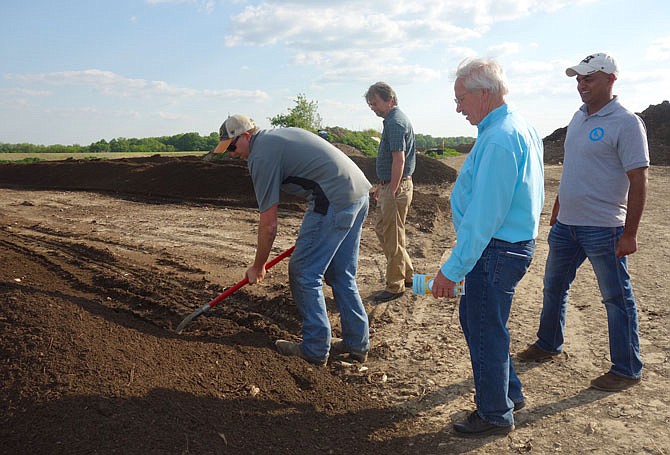The first thing one notices when arriving at Bluebird Composting is the smell - or the lack of it.
Members of the Fulton City Council - along with other officials and employees - visited the Bluebird site northwest of town for a tour on Tuesday. Even right among the compost piles, the only smell was something earthy and musty.
"That's what most people say, then they check their shoes - 'What shoes am I wearing,'" said Tyler Schwab, who handles sales for Bluebird.
Founded almost five years ago by Rana Bains on State Road HH, Bluebird takes in yard waste from the city, horse dung from William Woods and food scraps from the Fulton State Hospital, among others. Over the course of six months, waste turns into rich compost - between 6,000 and 7,000 cubic yards per year.
"If it goes into a landfill, that resource is gone," Bains said. "There, it will produce methane which is even more bad for the environment than carbon dioxide."
The composting facility does produce some of those gases - along with some odor - especially when the piles are being turned to mix them and regulate their temperature.
"No matter how good of a composter you are (it will smell), but only for 30 minutes; then it's done," Bains said.
He claims Bluebird avoids turning the piles on weekends or when the wind is strong.
"You have to be a good neighbor," he added.
Schwab admitted Bluebird does receive the occasional complaint, as do members of the City Council.
"I've had occasional calls," Ward 3 Councilman Richard Vaughn said. "I'm sure there are smells at times."
Employees of the state Department of Natural Resources, which has regulations on odors, have visited Bluebird several times, Vaughn confirmed.
"However, Bluebird has come within limits every time," he said. "From what I've been told, it's one of the better compost places."
Vaughn said without any county-level planning and zoning in Callaway, there would be few ways to address complaints.
"It's called, 'You live in the country,'" Rob Barnes, Fulton's assistant director of administration, said.
Just down the road, farm equipment spread human waste from the city on a field - by far the fouler smell.
"Is that us?" Director of Administration Bill Johnson said as he laughed.
Bains said sometimes he receives complaints about the neighboring odors. In his opinion, the end result is well worth the minor smells.
"For every inch of organic matter you add to the soil, you add an inch of water retention," he said.
That means less runoff to carry pollutants to nearby water. Plus, compost helps roots reach deeper into the soil, pulling up nutrients, he added.
After visiting Bluebird, Fulton Mayor LeRoy Benton and Ward 1 Councilwoman Mary Rehklau are considering spreading compost at the Fulton landfill to encourage grass growth, Rehklau said.
For more information about Bluebird, visit bluebirdcomposting.com.

